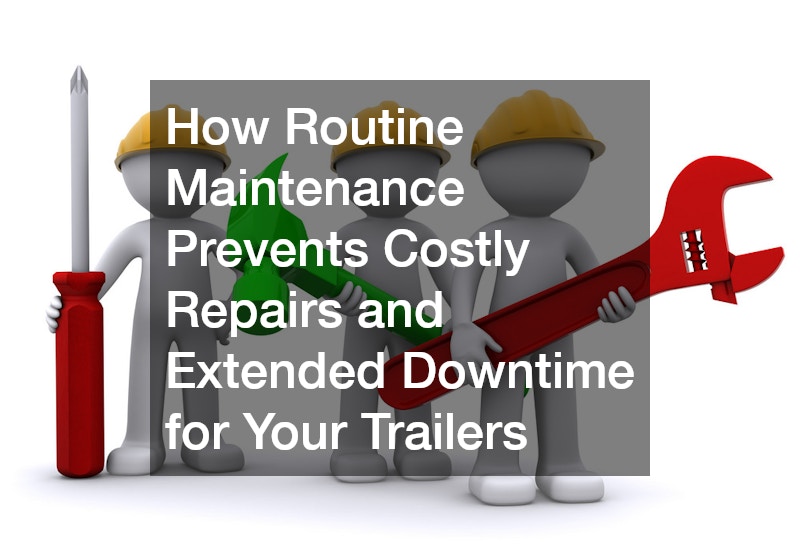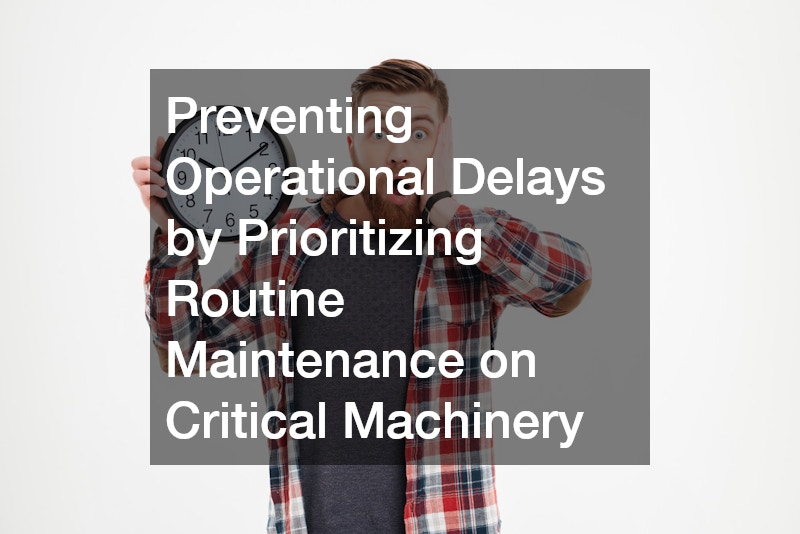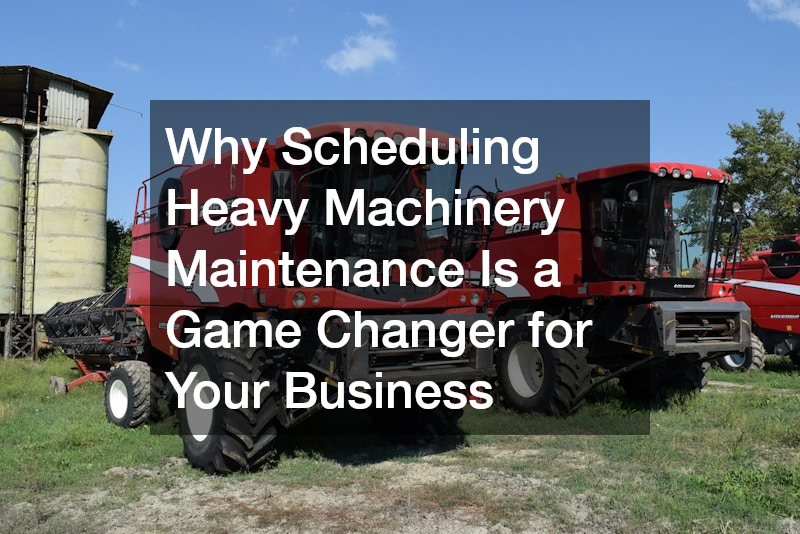In the world of heavy machinery maintenance, consistent care and proactive measures are crucial. The importance of routine maintenance cannot be overstated, particularly for companies involved in trailer sales, heavy-duty towing services, and diesel fuel delivery services, where uptime is critical to operations. When machinery is well-maintained, businesses can avoid unexpected downtime, reduce operational costs, and enhance overall efficiency. Without regular maintenance, equipment is vulnerable to wear and tear, increasing the likelihood of major breakdowns that can disrupt services and impact your bottom line. This article will explore the various benefits of consistent maintenance practices and the significant role they play in safeguarding your investments, ensuring your equipment performs at its peak, and minimizing costly repairs.
Heavy machinery maintenance encompasses routine checks and services on equipment such as trailers, cranes, forklifts, and other critical machinery. These preventative measures help avoid the need for extensive repairs by addressing minor issues before they evolve into major problems. Beyond prolonging the equipment’s lifespan, routine maintenance ensures that machinery is operating at optimal levels, reducing fuel consumption, improving safety standards, and minimizing service disruptions. Understanding and implementing these maintenance practices can make a profound difference in the operational efficiency, safety, and profitability of your business.
A comprehensive approach to maintaining heavy machinery involves a variety of strategies and practices. From applying protective coatings like spray-on bed liners to using extended warranty coverage for critical equipment, these actions contribute to keeping machinery in prime working condition. Additionally, proper fuel management and routine inspections ensure that your equipment is always ready to perform, while also extending its useful life. Let’s explore these essential strategies in more detail throughout this article, outlining the steps you can take to improve maintenance practices and safeguard your assets.
How Routine Maintenance Prevents Costly Repairs and Extended Downtime for Your Trailers

A key aspect of heavy machinery maintenance is routine checks, which can help catch minor issues before they become major problems. Regular maintenance checks on trailers can identify worn-out parts or potential faults that, if left unchecked, could result in severe damage and costly trailer repairs. This proactive approach helps maintain operational efficiency and helps avoid unexpected interruptions in service.
Ensuring that regular inspections are performed can save organizations from incurring significant expenses in terms of repairs and lost revenue from downtime. For businesses involved in trailer sales, such checks not only enhance reliability but also enhance customer trust and satisfaction by ensuring that products are always in top condition. Regular maintenance becomes a fundamental factor in maintaining the reputation and reliability of your services.
Furthermore, when trailers are frequently inspected and maintained, it enhances the overall value of your fleet infrastructure. By prioritizing scheduled maintenance, companies can enjoy streamlined operations and reduced dependency on emergency heavy duty towing services. As maintenance costs are predictable, it’s easier to budget and plan for them compared to sudden repair expenses from unexpected breakdowns.
Why Consistent Equipment Care Helps Maximize Coverage and Protects Your Investment

Adopting a regimented heavy machinery maintenance schedule ensures maximum equipment coverage and longevity. Regular maintenance checks make it easier to uphold the conditions required by extended warranty coverage, which often mandates periodic services. This assurance provides peace of mind and an additional layer of financial protection against hefty repair costs.
Aside from warranty considerations, consistent care minimizes wear and tear on your equipment. Businesses can maximize the value of their investment as traditional depreciation is offset by a well-maintained fleet. Organizations involved in trailer sales or crane repairs specifically benefit, as these activities necessitate agile and resilient machinery to meet client demands without interruption.
Scheduled maintenance extends beyond traditional heavy machinery; even golf cart services can benefit from regular care, ensuring they are always ready for use. Maintaining equipment accordingly reduces risks and surprises while maintaining high productivity standards. In the long run, routine care is less expensive than sporadic repairs, yielding considerable savings.
How Proactive Maintenance Reduces the Risk of Fuel-Related Issues and Increases Efficiency

Fuel management is a critical component of heavy machinery maintenance that should not be overlooked. Proactive maintenance involving regular checks of fuel tanks and systems prevents contamination and fuel-related issues. This is particularly important for services like diesel fuel delivery services, where efficiency and effectiveness can significantly impact operational performance.
Ensuring regular maintenance of fuel systems significantly reduces the possibility of fuel wastage and optimizes fuel consumption, which directly translates to cost savings. Additionally, proactive maintenance helps avoid fuel system clogs or leaks that could result in downtime, further preserving equipment efficiency and durability. These steps are crucial for maintaining the reliability of heavy duty towing services that rely on consistent performance.
Advanced maintenance solutions can include predictive analytics and fuel monitoring to enhance operational efficiency even further. Businesses that invest in these technologies find that they can anticipate potential issues and make informed maintenance decisions that bolster productivity. This, in turn, protects the machinery and contributes to prolonged equipment lifespan, supporting sustained business growth.
Protecting Your Investment: The Benefits of Extended Warranty Coverage for Equipment
Extended warranty coverage is a strategic option for businesses looking to protect their heavy machinery investments. These warranties ensure that businesses receive timely repairs and replacements with minimal financial interruption. Extended coverage acts as a safety net, allowing companies to focus on core activities like crane repairs or forklift repairs with added assurance.
By participating in extended warranty coverage, businesses minimize unexpected repair costs and ensure timely support, keeping machinery operational without undue delay. These warranties often come conditioned with adherence to routine heavy machinery maintenance, reinforcing the importance of steady care to receive full benefits. This proactive approach contributes significantly to your overall business continuity and stability.
For businesses relying on specialized equipment, such as those offering spray on bed liners or other niche services, having warranty protection helps manage the financial unpredictability of operating this equipment. Businesses benefit from a reduced administrative burden of handling complex repair logistics and can be sure their equipment maintains resale value. Having extended coverage is a guardian against the sizable impact of unexpected equipment failure.
Maximizing the Efficiency of Your Crane Fleet Through Routine Maintenance Services
Routine heavy machinery maintenance is essential for maintaining a high-functioning crane fleet. Issues in cranes can significantly impact both safety and productivity, making consistent upkeep vital. Routine services should include lubrication of moving parts, checking hydraulic systems, and ensuring that structural components remain intact, thereby preventing crane repairs caused by negligence.
Proactive crane maintenance significantly reduces the probability of mechanical failures that could lead to operational downtime and injury risks. A well-maintained crane enhances workplace safety and assures that tasks are executed efficiently and within set time frames. Companies can maximize crane fleet availability, thereby improving overall project turnaround time and customer satisfaction.
Moreover, performing routine checks aligns with adherence to existing legal and safety regulations. These practices contribute to maintaining lawful compliance and providing a safe working environment, which is particularly beneficial for companies that provide heavy duty towing services and other crane-dependent operations. Consequently, structured maintenance is a key pillar in supporting business success.
The Cost Savings of Scheduled Maintenance for Reducing Unexpected Equipment Failures
Scheduled maintenance is not just a regulatory requirement but a financial strategy for businesses operating heavy machinery. By conducting planned service checks, companies minimize the risk of unexpected equipment failures and the associated expenses. These preventative measures save significant funds that can then be reinvested into improving operations like trailer sales and golf cart services.
Comparatively, equipment that forgoes scheduled maintenance is prone to sudden breakdowns, leading to costly repairs and extended downtime. Heavy machinery maintenance helps identify and rectify potential problems before they mandate expensive solutions, creating much-needed budget stability. This practice ensures that machinery remains reliable, thus fostering reduced reliance on emergency heavy duty towing services or expedited forklift repairs.
Implementing a strict maintenance schedule allows for detailed management and tracking of a fleet’s condition. This transparency enhances logistical planning and forecasts maintenance needs, leading to optimized budgeting and an efficient allocation of resources. Ultimately, scheduled maintenance is an investment in reducing the cumulative cost of equipment operation and repairs.
Boosting Efficiency and Reducing Unexpected Service Calls Through Scheduled Equipment Care
Organizations that prioritize scheduled equipment care often report increased efficiency and a reduction in unexpected service calls. Regular maintenance helps maintain equipment integrity, ensuring that machines consistently perform at their ideal production capacities. This is especially important for businesses that deliver diesel fuel delivery services, where reliability and timeliness are crucial.
When machinery runs smoothly, service calls due to equipment failure are minimized. This reduction means less operational downtime and heightened equipment utilization, yielding higher productivity and cost-effectiveness. Scheduled maintenance proves to be an optimal strategy for businesses involved in activities such as spray on bed liners, where service consistency is linked to customer satisfaction.
The broad-reaching benefits of a diligent maintenance program also extend to service operations. By securing reliable operational performance, businesses can better allocate resources to expansion initiatives or other growth strategies. This approach ultimately enhances market competitiveness and supports a framework for long-term success.
Preventing Operational Delays by Prioritizing Routine Maintenance on Critical Machinery

Delays in operations can be detrimental to business performance, underscoring the importance of routine maintenance on critical machinery. By placing maintenance at the forefront, companies can circumvent potential disruptions in service delivery. Say, for instance, a business in crane repairs or heavy duty towing services, proactive maintenance ensures continuity in operations without compromising equipment safety and reliability.
Regular maintenance of equipment, such as cranes or fuel tanks, prevents potential bottlenecks and fosters seamless operational flow. This form of preparedness is aligned with industry best practices and results in uninterrupted service, bolstering a company’s punctuality and program deliverables. Ultimately, this leads to operational excellence and a distinct competitive edge.
Comprehensive maintenance protocols also align with risk management strategies, forecasting problems before they arise, and efficiently addressing them. Besides ensuring equipment readiness, this preemptive approach supports higher customer satisfaction rates and bolstered brand reputation. Companies can demonstrate their commitment to excellence through their adherence to routine maintenance, distinguishing themselves as reliable partners in their respective industries.
Why Routine Checks Are Essential for Keeping Heavy Equipment in Optimal Condition
Routine checks form the cornerstone of any successful heavy machinery maintenance strategy. They ensure that equipment remains in optimal working condition, extending operational life and improving efficiency. Regular inspections of machinery, whether for trailer repairs, spray on bed liners, or forklift repairs, identify areas needing attention before they escalate into costly malfunctions.
Consistent checks provide valuable data and insights into the condition and performance trends of machinery. These insights help organizations make informed decisions on necessary adjustments and improvements, leading to enhanced equipment reliability and longevity. By identifying potential issues early, companies can strategically plan for repairs and avoid costly emergency service disruptions.
Incorporating a thorough inspection routine upholds the highest standards of safety and performance. Companies can confidently meet their operational demands knowing that their equipment is well-maintained and reliable. Furthermore, routine checks instill confidence in clients and stakeholders, affirming a commitment to professional integrity and excellence in service delivery.
Heavy machinery maintenance plays an integral role in the overall success and stability of businesses reliant on industrial equipment. Whether involved in trailer sales, golf cart services, or crane repairs, integrating a proactive maintenance strategy safeguards investments and ensures peak equipment performance. The consistent application of maintenance best practices leads to significant cost savings and operational efficiencies.
As demonstrated, regular upkeep and care extend the lifespan of machinery, optimize fuel efficiency, and reduce the likelihood of breakdowns, all while maintaining compliance with warranty conditions. These measures culminate in a robust defense against operational downtime and provide a solid foundation for sustained business growth.
Ultimately, businesses committed to maintaining their machinery with regularity and precision are better positioned to thrive in competitive markets. With the right focus on routine checks and extended warranty coverage, operators can ensure their equipment’s readiness, fulfilling their strategic objectives while reliably meeting customers’ needs. In doing so, they articulate a dedication to quality and unyielding service excellence.

